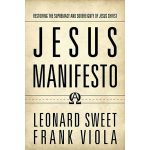Sweet, Leonard and Viola, Frank. Jesus Manifesto: Restoring the Supremacy and Sovereignty of Jesus Christ. Thomas Nelson, 2010. ISBN: 9780849946011.
Meet the Authors
 Leonard Sweet is the E. Stanley Jones professor of evangelism at Drew University and visiting distinguished professor of Evangelism at George Fox University, was voted one of the 50 Most Influential Christians in America, and continues to write and speak prophetically about the church. An ordained United Methodist pastor, Sweet has authored over 20 books and 600 articles, and is perhaps best known for his forward thinking ideas about the church. For more information, friend him on facebook, follow him on twitter, or visit his website.
Leonard Sweet is the E. Stanley Jones professor of evangelism at Drew University and visiting distinguished professor of Evangelism at George Fox University, was voted one of the 50 Most Influential Christians in America, and continues to write and speak prophetically about the church. An ordained United Methodist pastor, Sweet has authored over 20 books and 600 articles, and is perhaps best known for his forward thinking ideas about the church. For more information, friend him on facebook, follow him on twitter, or visit his website.
 Frank Viola is an author and popular conference speaker. He has written numerous books on the deeper Christian life and radical church reform, including From Eternity to Here, Jesus Manifesto (co-authored with Leonard Sweet), and Pagan Christianity (co-authored with George Barna) as well as Finding Organic Church, Reimagining Church, and The Untold Story of the New Testament Church. For more information, friend him on facebook, follow him on twitter, or visit his website.
Frank Viola is an author and popular conference speaker. He has written numerous books on the deeper Christian life and radical church reform, including From Eternity to Here, Jesus Manifesto (co-authored with Leonard Sweet), and Pagan Christianity (co-authored with George Barna) as well as Finding Organic Church, Reimagining Church, and The Untold Story of the New Testament Church. For more information, friend him on facebook, follow him on twitter, or visit his website.
Book Basics
In contrast to other options that seek to call individuals and the church to move either right or left, Jesus Manifesto seeks to provide a third way that its authors view as a way of going forward. The authors want to replace the many models that place Jesus as just this (i.e. a cause to give one’s life to) or just that (i.e. a good moral teacher one should imitate) with a model that restores the full nature of the person of Jesus with an emphasis on Christ’s supremacy and sovereignty. While the idea of a book calling Christ followers and Christ’s bride back to a focus on Christ is theologically sound and appropriately countercultural, the ways to achieve that goal are less helpful and less about Christian unity than I had hoped. Additionally, several chapters felt forced and relied more heavily upon a number of extended quotes from the bible than on substantive development by the authors.
third way that its authors view as a way of going forward. The authors want to replace the many models that place Jesus as just this (i.e. a cause to give one’s life to) or just that (i.e. a good moral teacher one should imitate) with a model that restores the full nature of the person of Jesus with an emphasis on Christ’s supremacy and sovereignty. While the idea of a book calling Christ followers and Christ’s bride back to a focus on Christ is theologically sound and appropriately countercultural, the ways to achieve that goal are less helpful and less about Christian unity than I had hoped. Additionally, several chapters felt forced and relied more heavily upon a number of extended quotes from the bible than on substantive development by the authors.
So What?
Jesus is central to Christianity. Christians are by definition Christ followers. What does it mean for you to place Jesus at the center of Christianity on a personal level? On the level of a local congregation?
Note: I have previously reviewed two books written by Leonard Sweet. My review of Nudge (2010), a good discussion starter on the topic of evangelism in a postmodern world, can be read here. So Beautiful (2009) offers a much stronger and more thoughtful discussion of what a renewed focus on Jesus would mean for the church than does Jesus Manifesto. My review of So Beautiuful can be read here.